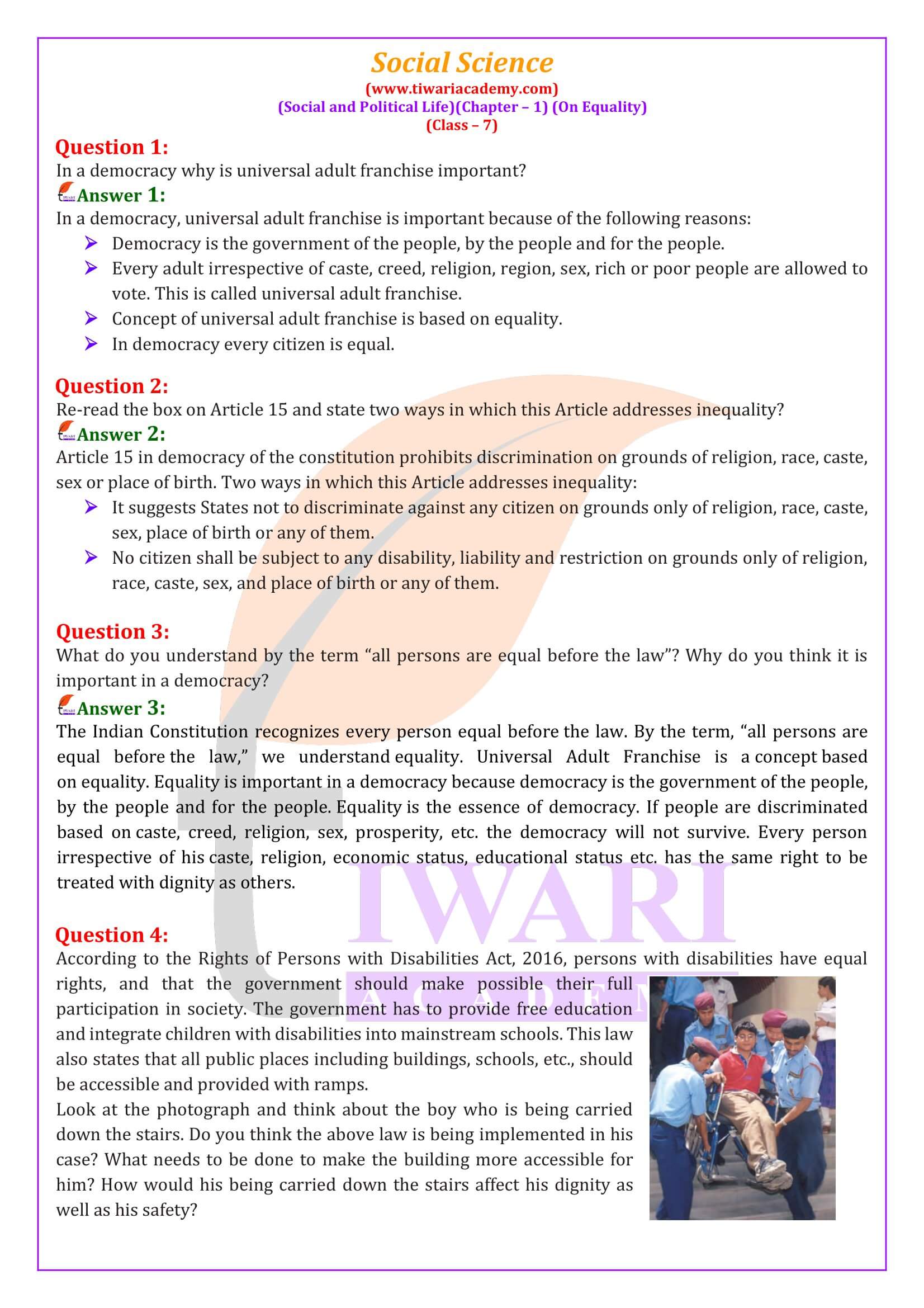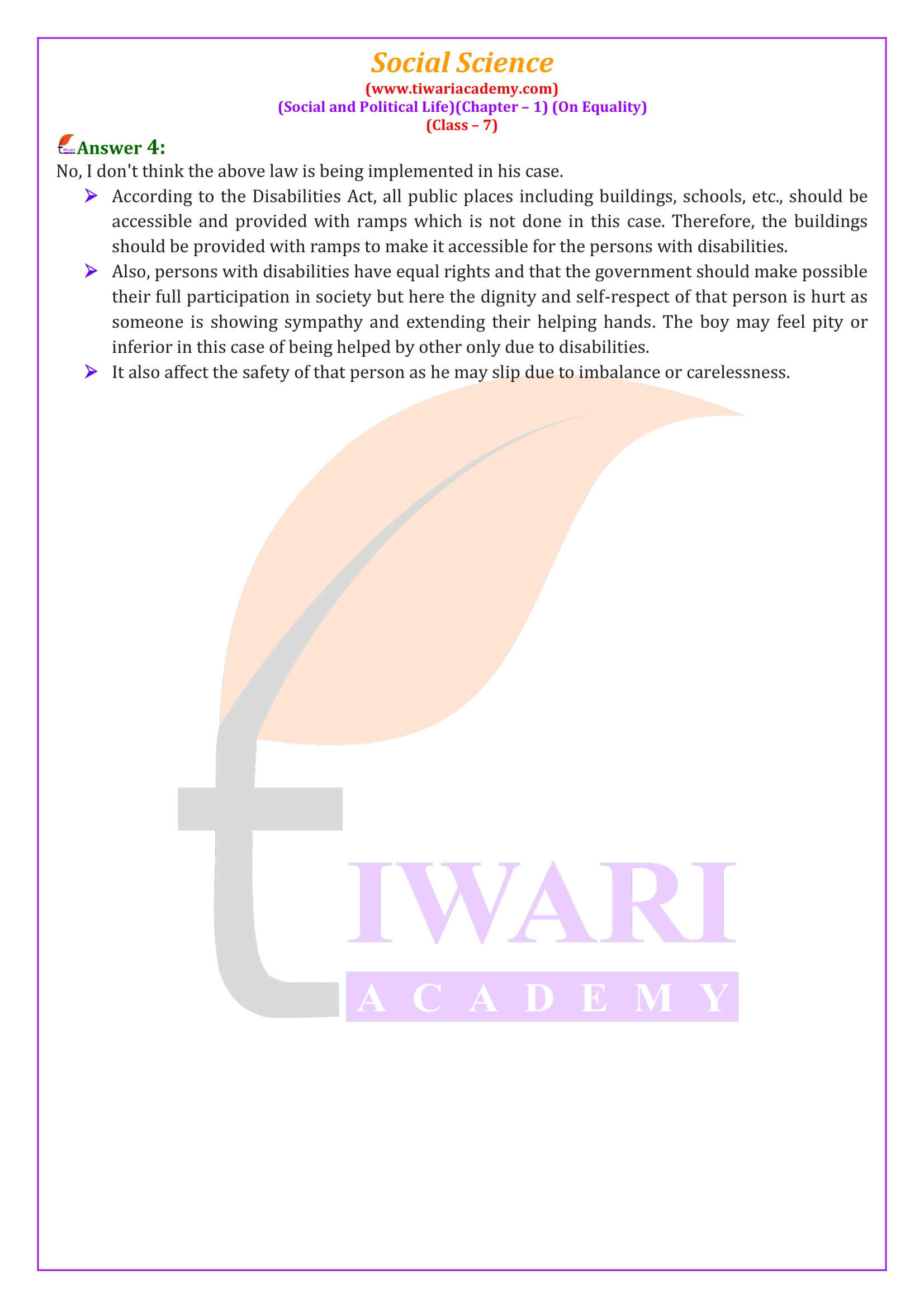NCERT Solutions for Class 7 Social Science Civics Chapter 1 On Equality Unit 1 in English Medium and Hindi Medium free to View online or download in PDF free updated for new academic session 2024-25 based on latest NCERT Books. All the NCERT Solutions are based on latest NCERT Books for the academic session 2024-25. Class 7 Political Science solutions are prepared in online mode as well as offline apps format.
NCERT Solutions for Class 7 Social Science Civics Chapter 1
Class 7th Civics Chapter 1 Solution in Hindi and English Medium
| Class: 7 | Political Science |
| Subject: | Social Science |
| Chapter 1: | On Equality |
| Contents: | English and Hindi Medium Solutions |
| Academic Year: | Session 2024-25 |
Class 7 Civics Chapter 1 Question Answers
CBSE NCERT Solutions for Class 7 Social Science – Political Science Chapter 1 On Equality Unit 1 is given here in Hindi and English Medium updated format for the new academic session 2024-25. Download NCERT solutions 2024-25 in PDF form for offline use or use as it is without downloading online.
Important Notes on 7th Civics Chapter 1
India is a democracy. These include people’s participation, the resolution of conflict, and equality and justice. Equality is a key feature of democracy and influences all aspects of its functioning.
In a democratic country, like India, all adults irrespective of what religion they belong to, how much education they have had, what caste they are, or whether they are rich or poor are allowed to vote. This is called universal adult franchise and is an essential aspect of all democracies. The idea of universal adult franchise is based on the idea of equality because it states that every adult in a country, irrespective of their wealth and the communities she/he belongs to, has one vote.
Apart from being poor, people in India experience inequality in different ways.
One of the more common forms of inequality in India is the caste system. If you live in rural India your caste identity is something that you probably learned or experienced very young. If you live in urban India some of you might think that people no longer believe in caste.
Dalit is a term that the so-called lower castes use to address themselves. Dalit means ‘broken’ and by using this word, lower castes are pointing to how they were, and continue to be, seriously discriminated against.
Class 7 Social Science – Civics Chapter 1 – Important Questions
In a democracy why is universal adult franchise important?
In a democracy, universal adult franchise is important because of the following reasons: Democracy is the government of the people, by the people and for the people. Every adult irrespective of caste, creed, religion, region, sex, rich or poor people are allowed to vote. This is called universal adult franchise. Concept of universal adult franchise is based on equality. In democracy every citizen is equal.
Re-read the box on Article 15 and state two ways in which this Article addresses inequality?
Article 15 in democracy of the constitution prohibits discrimination on grounds of religion, race, caste, sex or place of birth. Two ways in which this Article addresses inequality: It suggests States not to discriminate against any citizen on grounds only of religion, race, caste, sex, place of birth or any of them. No citizen shall be subject to any disability, liability and restriction on grounds only of religion, race, caste, sex, and place of birth or any of them.
In what ways was Omprakash Valmiki’s experience similar to that of the Ansaris?
By picking on him and making him sweep the school, because of his caste, Omprakash Valmiki’s schoolmates and teachers hurt his dignity badly and made him feel as if he was less equal to all other students in the school. Omprakash Valmiki was not allowed to sit with other students on the desks or mats but at the end of the worn-out mat. Being a child, Omprakash Valmiki could do very little in this situation. The Ansaris dignity was also hurt when persons refused to lease their apartments to them. However, when the property dealer suggested that they change their name, it was their dignity or self-respect that made them refuse his suggestion. Omprakash Valmiki’s experience was similar to that of the Ansari’s because both were treated unequally based on caste and religion, their dignity was violated. They both deserved the same equality, respect, and dignity as anyone else.
What do you understand by the term “all persons are equal before the law”? Why do you think it is important in a democracy?
The Indian Constitution recognizes every person equal before the law. By the term, “all persons are equal before the law,” we understand equality. Universal Adult Franchise is a concept based on equality. Equality is important in a democracy because democracy is the government of the people, by the people and for the people. Equality is the essence of democracy.
If people are discriminated based on caste, creed, religion, sex, prosperity, etc. the democracy will not survive. Every person irrespective of his caste, religion, economic status, educational status etc. has the same right to be treated with dignity as others.
Equality in India
The Indian Constitution recognizes every person as equal. This means that every individual in the country, including male and female persons from all castes, religions, tribes, educational and economic backgrounds are recognized as equal. This is not to say that inequality ceases to exist. It doesn’t. But at least, in democratic India, the principle of the equality of all persons is recognized.
No country can be described as being completely democratic. There are always communities and individuals trying to expand the idea of democracy and push for a greater recognition of equality on existing as well as new issues. Central to this is the struggle for the recognition of all persons as equal and for their dignity to be maintained.




